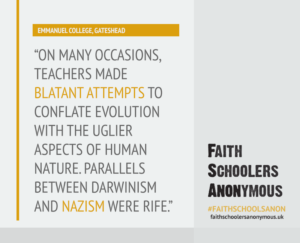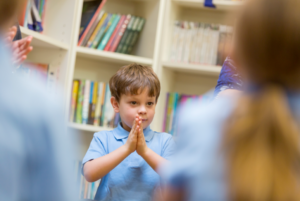‘my child should not be penalised and put at the bottom of a long, long list just because his parents don’t have a particular belief. This just seems all so, so wrong’

Every year, hundreds of thousands parents find themselves unable to get their children into their local schools due to the religiously-selective admissions criteria that many of them employ. On its own, this is little more than state-funded religious discrimination, but it also has the corollary effect of unfairly limiting the choice of vast swathes of the population who are either of the ‘wrong’ religion, or who aren’t religious at all. Of course, this can be more of a problem in some areas than it is in others.
Take, for example, the case of one mother from Farnham in Surrey, who got in touch with the Fair Admissions Campaign, a group set up to bring an end to religious selection:
‘Of the 10 schools closest to us, only 2 do not require you to attend Church or follow the Christian faith. My daughter was rejected by the 4 schools we listed and instead placed in the worst school in our area. It is a failing school that has been placed in special measures and we have heard of numerous accounts of parents removing their children due to bullying. We chose to live here because of the schools and to be close to one set of parents. At the time we made that decision, neither of us were aware of the admissions policies.’
She went on to say that ‘to judge a FOUR YEAR OLD on her religious beliefs is ridiculous.’
Regrettably, limits to parental choice of this kind are extremely common. In Kensington and Chelsea for instance, around 60% of places are subject to religious criteria:
‘My wife and I have been going through the process of applying for a primary school place for our son. We live in Kensington and Chelsea. Forced to take a close look at how the system worked, we were appalled to see the distorting effect that faith schools had on our choice. We’re not fans of the concept in general but were particularly aggrieved when it became clear that, because all even half-decent schools in K&C are oversubscribed, we had less choice of taxpayer-funded schools than someone whose child was a Catholic, has been baptised, etc. Any of those people can of course apply to a non-faith school and get an equal chance of a place to us but the converse is not true.’
Unsurprisingly, parents of the wrong or no faith are disproportionately disadvantaged by such criteria. The consequences of this are well-documented, as is attested to by this mother:
‘Like many parents, my nearest three schools are faith schools which are able to prioritise church-going children over non-church-going ones (two Christian, one Catholic). They are always heavily oversubscribed…Speaking to other parents, I’ve confirmed what I thought were simply my negative suspicions – parents attending church purely to get a place at these schools. They begrudge their lost Sundays, but they do it.’
Unwilling to do the same, she was forced to apply for a place at a school with no religious character further away from home and, in her own words, ‘cross my fingers, expecting to spend 2012/3 in appeals’.
As it currently stands therefore, the system rewards parents who lie about their religion in order to get their children into school, with a recent poll suggesting that as many as 36% of parents have done this or would be willing to. Conversely, the system penalises and drastically limits the choice of parents who rightly feel uncomfortable with this. As this particular mother put it, ‘my child should not be penalised and put at the bottom of a long, long list just because his parents don’t have a particular belief. This just seems all so, so wrong’.
A version of this blog post first appeared on the Fair Admissions Campaign website in July 2015.


 The legal requirement placed on all state-funded schools in the UK to enforce a
The legal requirement placed on all state-funded schools in the UK to enforce a